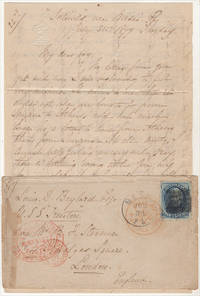1877 - "ON ONE OCCASION THEY MET 14 MILES THIS SIDE OF ALTOONA MORE THAN 200 STRIKERS." Letter from a prominent Pennsylvania woman to her overseas Naval Officer son describing the Philadelphia City Troop's response to the Great Railroad Strike of 1877 by Maria C. Rudder to Luis S. Beylard - 1877
by Maria C. Rudder to Luis S. Beylard

1877 - "ON ONE OCCASION THEY MET 14 MILES THIS SIDE OF ALTOONA MORE THAN 200 STRIKERS." Letter from a prominent Pennsylvania woman to her overseas Naval Officer son describing the Philadelphia City Troop's response to the Great Railroad Strike of 1877
by Maria C. Rudder to Luis S. Beylard
- Used
- very good
In this letter, Ms. Rudder's attachment to her "precious child" is clear as she makes a point to tell him, "for unless all goes well with you there is no happiness in life for me." Of more importance, she describes actions taken by the "City Troop" (First Troop Philadelphia City Cavalry) during the Great Railroad Strike of 1877.
"You will see by the newspapers which I send you, all about the rail-road troubles. Things have quieted down a good deal and the trains are now running through to Pittsburgh. Gov Hartranft and Gen Hancock having taken the first freight train through with a large military and they are still there. The City Troop is there also - it is said they have behaved well. On one occasion they met 14 miles this side of Altoona more than 200 strikers. I believe there were also 40 members of another company with the troop - these latter gave their arms to the strikers & said 'we did not come here to shoot down laboring men' & so there were the troops (35 in number) at the mercy of these wretches. They were told to give up their guns & Col Snowden said they would not, but that they would not fire. . .; Harry Norris is still away with the Troop which is now in Pittsburg. . .. I don't think there will be any more trouble with the strikers en masse but do fear very much accidents to trains by mis-placed switches, obstructions, etc."
The Great Railroad Strike of 1877 began in mid-July at Martinsburg, West Virginia, after the Baltimore & Ohio cut salaries for the third time due to the 'Long Worldwide Recession' that began in 1873. When a striker was killed after shooting a state militiaman in the head while he attempted to reset a switch, the strike spread like wildfire throughout the northeast, stretching along railroad lines from New York and Maryland to Missouri.
The strikers were joined by thousands of other workers, ne'er-do-wells, Marxists, socialists, and outright criminals that vastly overwhelmed small state militias and city police forces. The resulting riots and the mob violence, destruction, and thefts were evocative of the Paris Commune of 1871, and the militia, National Guard, regular Army were called in to restore order.
When the strike ended in August, the railroad workers found their situations had not improved, although their action served as a catalyst for the expanding labor movement to organize unions, and it focused national attention on workers' wages and conditions.
(For the most objective information about the strike, uncolored by revisionism, see Martin's The History of the Great Riots. . .. and Shroeder's "Urban Warfare: Pittsburgh, 1877," a chapter within his master's thesis, The Elementary School of the Army: the Pennsylvania National Guard, 1877-1917.)
-
Seller
Kurt A. Sanftleben, LLC
(US)
- Format/Binding Envelope or Cover
- Book Condition Used - Very good
- Place of Publication Idlewild [Hotel] near Medina, Pennsylvania to the U.S.S. Trenton at London
- Date Published 1877